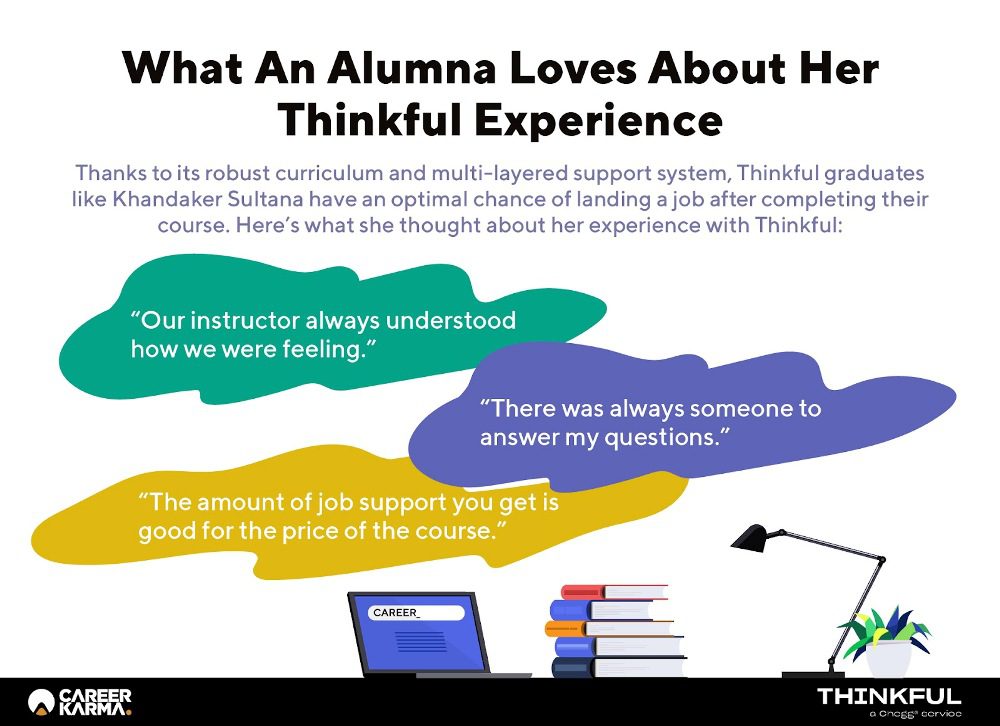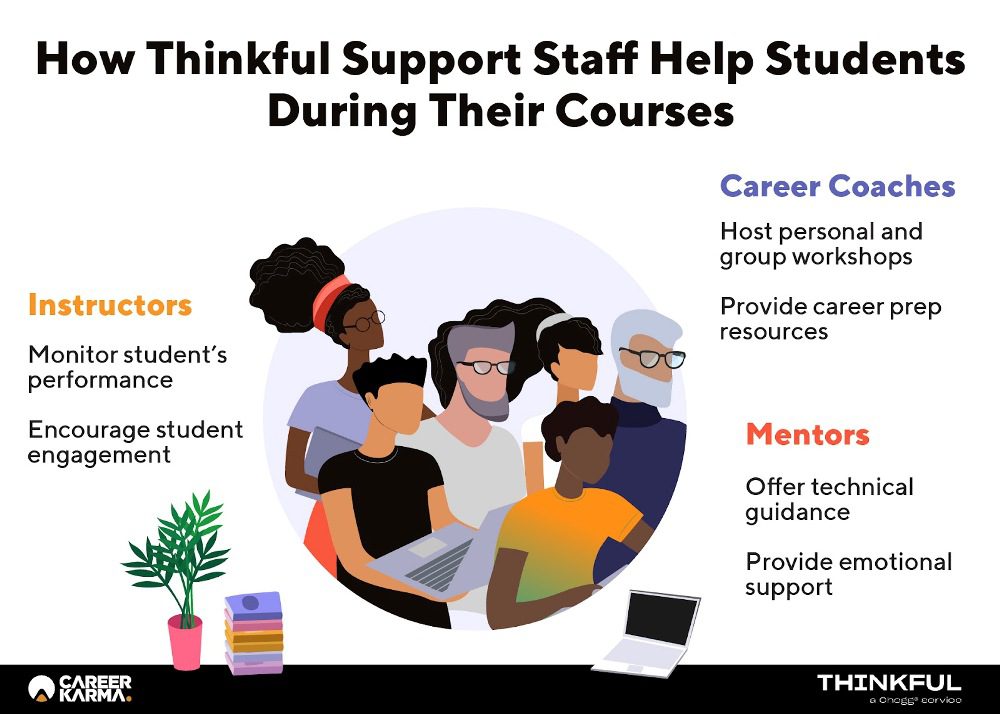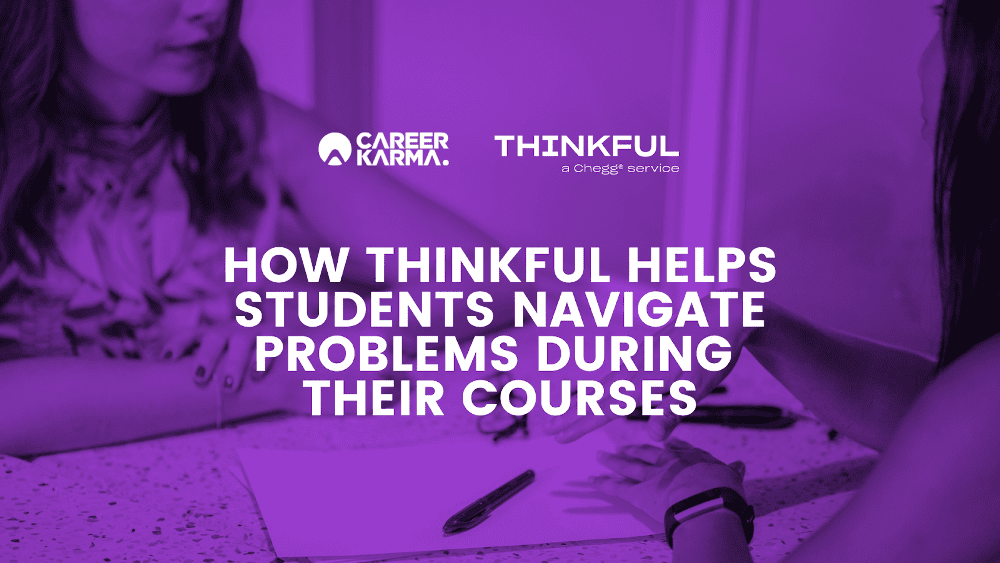Thinkful helps students change careers, fast. And that means you’ll have to learn a range of new skills in just a few months. But you’re not studying alone.
In a previous Thinkful review, we covered the strong support system for students at Thinkful. Here’s how that strong support system springs into action whenever a student reaches out for assistance.
Thinkful’s Support System
Thinkful’s support system consists of instructors, mentors, career coaches, and more. The instructors guide students through the curriculum with nuanced explanations and real-life industry perspectives. The mentors give students a picture of how the industry operates and answer any questions they may have about working in the field. The career coaches prepare students for success with personal and group-based career workshops to help them break into the tech industry.
And even if you’re working after hours, Thinkful will be there with you. Students can reach out for help 24/7 in a dedicated Slack channel as they work through homework. So even if you’re getting to your homework at midnight, there will be someone there to make sure you’re not left behind.
The personal touch from Thinkful’s support system is making a key difference for students. They’re never alone as they work their way through the curriculum in hopes of building skills for a new career.

Help When You Need It
Khandaker Sultana graduated from Thinkful’s Software Engineering program. She initially earned a degree in computer science but took time out from her field to take care of her family. When she decided to get back into working, she decided Thinkful’s program was her best option.
“I had been looking at online bootcamps for some time and came across Thinkful,” Khandaker said. “Before the course, they offer prep coursework to prepare you to apply to the full course, which was not only free but also came with a mentor who helped me twice a week.”
Khandaker’s course started smoothly. But as you can expect during any learning experience, there were times when the challenge increased. She credits the staff at Thinkful for helping her make it through the program with patience and care.
“While I was taking the front end (React) portion, it was so hard to understand. But our instructor always understood how we were feeling,” Khandaker said. “He took the extra time to help us.
Whether it’s the technical support team or the community managers and mentors in the platform, there was always someone to answer my questions. It seemed like they really care about the students’ progress and they are eager to see them finish the course successfully.”
Thanks to its robust curriculum and multi-layered support system, Thinkful graduates like Khandaker Sultana have an optimal chance of landing a job after completing their course. Here’s what she thought about her experience with Thinkful.
“It was awesome. The amount of job support you get is good for the price of the course,” Khandaker said. “I think it can be difficult to take the leap and jump in, and I recognize that there was a bit of luck that went into my success, but if you are curious about software development and able to work hard to develop your portfolio, I think Thinkful is worth looking into.”
Khandaker gave high praise to the instructors, and once you see the passion that these educators bring to their positions, you’ll understand why.

Thinkful Instructors
Stephanie Jones is an instructor in Thinkful’s Data Analytics program. This program gives students who want to pursue a data science career a great entry point into the industry. As an instructor who has been with Thinkful for a while, she’s used to seeing students get hung up on certain phases of the program.
“Students’ largest struggles are during our final projects, called ‘capstones,’ where they work on open-ended business objectives with real data,” Stephanie said. “Unlike our lessons, these assignments do not give you explicit directions on which formulas to use and where. These mirror the real-world data questions students will face in the industry. But, of course, Thinkful support is there to help them guide their analysis and suggest new directions.”
During these capstone projects, instructors have to take off the training wheels and allow students to find their own way. It can be challenging for students to make the leap, but the instructors are there to provide encouragement. And with the extraordinary amount of experience they have, they know just how to help frustrated students.
“The most important thing to remember is that frustration is part of the learning process, and they need to trust that process,” Stephanie said. “For example, when I’m teaching Python I remind them that they are learning a new language. And just like learning Spanish or another language, certain things will come easier to them than others. It’s completely normal, and it’s how every single person in data analysis had to learn as well.”
Because Thinkful strives to give students a taste of their new careers, Stephanie advises students to get used to asking for help and accepting their limits.
“Embrace the frustration and practice asking for help. My rule of thumb for when they have to ask for help is after 15 minutes of no progress,” Stephanie said. “Everyone in your resources at Thinkful has had the frustration of learning this topic, and all of us are excited to help future Data Analysts through it.”
These are instructors who have been in your shoes before, and they’re excited to help bring up the new generation in their field of choice. And they’re just one part of the caring team that finds purpose in supporting students through their struggles.
“At Thinkful, students have support in many different forms: lectures, mentors, TAs, office hours, ThinkChat, Academic Success Managers, even their own cohorts,” Stephanie said. “I think this is where a big portion of our success comes from; Thinkful recognizes there are different learning styles, and different learners need different options. Visual learners may excel from lecture demos, whereas verbal learners may gain additional comprehension explaining their work to their mentor. Every student has the opportunities to be successful.”
Students can see examples of success all around them. From fellow Thinkful graduates that work at some of the biggest names in tech to their mentors who provide informed guidance about their future.
Thinkful Mentors
Mentors help give students a view of what’s possible after they’re established. These experts provide emotional support while guiding students on the ways that they’ll use the tools they’re learning after graduation. And they do so because of their passion for helping others.
Alexjandro Daviano has been mentoring Data Science students for over two and a half years. In this time, he’s mentored around 30 students, and helped over 150 more in various capacities, including his work as a technical expert. He’s heard all of these students’ struggles and seen most of their common roadblocks.
“Some of the most common issues that I have seen from students are about the application of the curriculum to the real world,” Alexjandro said. “I have also seen many students need help with the theory and some methodology behind the learnings to better understand the “why’s” of the program. Regarding the curriculum, many students have come to see me about problems regarding the different ways to accomplish tasks. It needs to, at times, be explained that if they can do things another way to accomplish the same thing, that’s ok.
The real world doesn’t always have the neat solutions that problems in an educational setting may have. Mentors help students figure out their style of working and how to apply it to their new careers. Students can sometimes be afraid to ask for help, but mentors work to make them comfortable.
“I think it helps that the pairing process is a two-way street and that they quickly see after a week or so that I’m here to help them,” Alexjandro said. “But to help with that initial tension, I try to be as open as possible, as positive as possible, as helpful as possible, and as welcoming as possible to help the student see that I am their ally and only want the best for them.”
Mentors only work with a few students at a time to ensure that each student gets the attention that they deserve. This way, if a student feels unsure about something from their larger classroom setting, they can reach out to their mentor for more information and clarification. Alexjandro believes that the many layers of student support multiply their chances of success.
“I would say that it is layered. I say this because there are many layers built in to catch you before you fall,” Alexjandro says. “We have technical coaching built into the curriculums, TAs for full-time students, mentors for perspective, and Academic Success Managers who are with the student the entire way, and will move heaven and earth to get their students what they need.”
If you’re worried about the challenges you’ll find throughout your coding bootcamp, Alexjandro believes that Thinkful’s support system can do a lot to provide peace.
“I think my advice would be to take the plunge if you are looking to improve your technical skills, build a relationship with a great mentor and start a journey that will help you accomplish your career goals,” Alexjandro said. “We are all here to help and make sure that you get through a rigorous program with not only a great experience, but a thorough understanding of your new field to set you up for a bright future.”
Long-Term Support at Thinkful
Stephanie and Alexjandro both mentioned the Academic Success Managers (ASMs) at Thinkful, who stay in contact with students throughout their learning experience. ASMs facilitate student success with a few different methods. They help students adjust to their course, make sure that they are keeping their goals in mind, and more.
ASMs keep students motivated and prepared for every step of their journeys. They give students time management tips and more to put them in the best position to succeed. Because they spend so much time working with students, they feel comfortable speaking for them to make sure they get everything they deserve.
Of course, students also get help from a career coach during their time in the program. These individuals help students strengthen their job-hunting materials and mindset with several programs and one-on-one meetings. Career coaches guide students for up to six months after graduation to help them navigate the job market and keep them motivated if they run into any trouble.
These two support roles show that Thinkful is truly invested in their students’ wellbeing. No matter the stage of the program you’re in, you’ll have someone to reach out to when you need it most.
Learning and Support at Thinkful
Students can access help at multiple stages before and after their time at Thinkful, and there’s always someone a message or an email away to help them solve any issues they may be having.
You’re never alone during your time at Thinkful, and the support provides the perfect launchpad to a new career. If you want to learn more about the support team at Thinkful, visit its website today.
About us: Career Karma is a platform designed to help job seekers find, research, and connect with job training programs to advance their careers. Learn about the CK publication.




